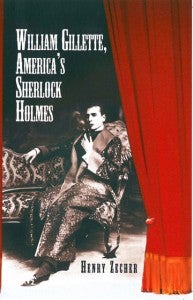Sherlock Holmes personified
Published 8:59 am Monday, April 18, 2011
New biography tells story of Gillette’s life in Tryon, elsewhere
Actor and playwright William Gillette is well known in Tryon, not only for his iconic portrayal of Sherlock Holmes but also for his impact on this area.
Gillette lived in Tryon from 1891 until 1910. He built his home, Thousand Pines, in what is now the Gillette Woods residential area. Gillette was active in the community, performing in local theatrical productions of his plays and supporting artists such as Amelia Watson.
The story of Gillette’s Tryon years, along with the rest of his life, is told in a new biography called “William Gillette, America’s Sherlock Holmes.”
Written by Henry Zecher, a longtime Sherlock Holmes fan, the book calls Gillette one of the American theater’s greatest stars. He wrote the first popular play about Sherlock Holmes and performed it more than 1,300 times in England and America. He brought Holmes to life and established for all time the image of Holmes with the deerstalker cap, the bent briar pipe and the profile, creating what may be the most instantly recognizable icon in the world. According to Zecher’s biography, it was from Gillette’s play that Hollywood film-makers derived the famous phrase, “Elementary, my dear Watson.”
“Gillette established the manner in which Holmes was to be portrayed,” Zecher said. “Mysteries in general have been staged on the template he created; and, until Jeremy Brett did his own interpretation, actors playing Holmes for the next several decades did it the way Gillette did it.”
More than bringing Holmes to life, however, Gillette was among the 19th century’s most successful actors and playwrights. In a career spanning six decades, he was one of the best-known celebrities in the Western world.
“Gillette was a towering figure in an age of towering figures,” Zecher said. “Among his friends were Mark Twain, Sir Arthur Conan Doyle, Theodore Roosevelt, Harriet Beecher Stowe, Thomas Nast and Maurice Barrymore.”
Among the young stars Gillette helped at the dawn of their careers were Ethel Barrymore, Charles Chaplin and Helen Hayes, and later screen stars made their film debuts in productions of his plays:
• William Powell in “Sherlock Holmes” in 1922, starring John Barrymore as Holmes;
• Meryl Streep in the 1976 Broadway Theater Archive filming of Gillette’s greatest play, “Secret Service,” co-starring John Lithgow; and
• Christian Slater in “Sherlock Holmes” in 1981 opposite Frank Langella as Holmes.
“William Gillette, America’s Sherlock Holmes” is the first full biography ever published on Holmes, Zecher said.
The book is published by Xlibris Press in Bloomington, Indiana.
– article submitted






